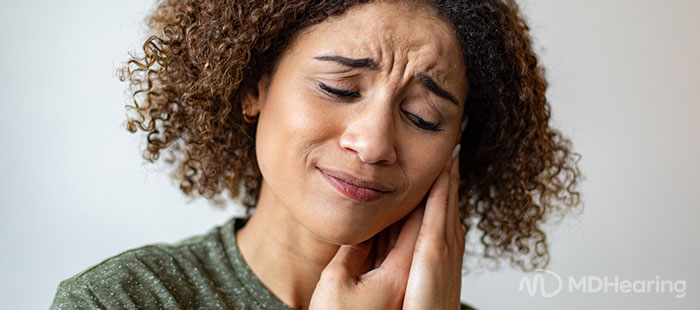There's nothing more bothersome than dealing with an itch that won’t go away, especially when you can't reach the irritation. Studies indicate that 1 in 5 individuals will experience chronic itching in their lifetime. Moreover, itchy ears are a fairly common issue among hearing aid users due to the sensitive skin inside of the ear canal. While many find that the discomfort eases as they become accustomed to the ear molds, persistent ear itching could signal an infection or a more serious issue.
It's crucial to understand the causes, symptoms, and remedies for itchy ears before the situation worsens.
Quick Navigation
What is Itchy Ear?
Itchy ear is characterized by a persistent tingling or irritation that prompts the urge to scratch or rub. It can be a temporary or chronic discomfort.
In general, itching is usually a minor issue. However, itchy ears could indicate a sign of an underlying medical condition, potentially leading to inflamed or infected ears.
Causes of Itchy Ear
Numerous factors can contribute to itchy ears, affecting both the outer and inner ear regions. Understanding the cause is vital for effective relief. Some common causes include:
Dry Skin on the Ear
Dry skin (also called xerosis or xeroderma) is a common culprit for itchiness. The skin should contain at least 10 percent water to feel soft and have a normal stretch. Anything less, and your body will feel rough and dry.
Although it’s more common to have dry skin on your legs and feet, it’s possible to have dry skin on your ear too. Dry, itchy skin can be caused by anything from the environment to hair products to medications, or simply aging.
-
Environment: Dry air, indoor heaters, sun damage, windy weather, cold temperatures, or long, hot showers
-
Chemicals: Magnesium and calcium in hard tap water, chlorine in swimming pools
-
Consumer Products: Harsh soaps and skin cleansers, shampoos and conditioners, hairsprays, gels, and mousses, lotions and moisturizers, perfumes and colognes
-
Medications: Statins, diuretics, cancer treatments, acne medicine (salicylic acids), retinol
-
Medical Conditions: Diabetes, thyroid disease, kidney disease, vitamin deficiency, genetics, aging
Ear Dermatitis, Ear Eczema, and Psoriasis
Ear dermatitis (irritation of the skin) and ear eczema (inflammation of the skin) appear at the ear folds, behind the ear, and between the earlobe and face. However, irritated and inflamed areas can appear anywhere, including the ear opening, ear canal, earlobe, and even the eardrums. Compared to other conditions, eczema can cause more extreme itching.
Several types of dermatitis can occur. They vary depending on the cause, location, and appearance of the itchiness.
-
Ear eczema (atopic dermatitis): Caused by abnormally sensitive skin
-
Seborrheic dermatitis: Caused by a fungus near oil glands
-
Asteatotic eczema: Caused by temperature changes or excessive washing
-
Contact dermatitis: Caused by a substance that touches the skin
-
Psoriasis: Caused by skin cells that too grow too fast and buildup
Ear Infections
Itchy ears could be a sign that you have an ear infection. There are many causes of ear infections, most of which come from upper respiratory conditions or moisture in the ear.
-
Colds or flu: Caused by a virus
-
Pneumonia: Caused by a virus, bacteria or fungus
-
Sinusitis: Caused by a virus or bacteria
-
Swimmer’s ear (otitis externa): Caused by a fungus or bacteria
Ear Wax Buildup
Your ear produces protective wax from glands located inside the ear canal. This is nature’s way of cleaning dirt, bacteria, and dead skin cells out of your ear. Usually, ear wax makes its way to the ear opening, where it falls out or is wiped clean.
Occasionally, ear wax can build up in the ear canal, blocking the ear canal and causing the ears to be itchy. In severe cases, the wax can become hardened and difficult to remove, which can lead to hearing loss.
Allergies and Sensitivities
Some people are allergic to certain substances. When touched or eaten, the body's immune system may react. This can lead to itchy ears and other symptoms.
-
Jewelry sensitivities: Caused by nickel and other materials in earrings
-
Hay fever: Caused by allergies to pollen, trees, grass, and weeds
-
Food allergies: Caused by certain foods, including vegetables, fruits, and nuts
Insect Bites on the Ear
Insect bites are another common cause of itchiness. When you are bit by certain bugs, it’s natural for that area of your body to itch. If you’re sensitive or allergic to a particular type of bug, your symptoms may be more intense. Some of the insects most notorious for itchy bites include:
-
Mosquitoes
-
Fleas
-
Chiggers and other mites
-
Head lice
-
Bed bugs
-
Sand fleas (“no-see-ums”) and other flies
Anxiety
Anxiety can happen to anyone and cause the body to respond to stress. This can lead to a burning or itching sensation on the skin. Anxiety-related itching (psychogenic itch) often leads to nervous habits, including scratching the arms, legs, face, scalp, and ears. People with anxiety may experience itching at the same time as other symptoms, or by itself.
Hearing Devices
Various devices worn on your ears can also be the culprit. Earbuds, hearing aids, and ear molds can cause irritation from rubbing. They can also block the ear canal, resulting in a buildup of moisture and ear wax.
Symptoms of Itchy Ear
Itchy ear symptoms vary depending on the underlying cause. While itching is the most noticeable symptom, you may experience other indications as well, such as:
-
Rough, dry skin
-
White flakes
-
Bumps or blisters
-
Leathery or scaly rash
-
Crusty ears
-
Red or swollen skin
-
Cracked and bleeding skin
-
Drainage from ear
-
Fever (from infection)
Hearing loss is not considered a symptom of itchy ear. However, itchy ears could be caused by a buildup of wax and ear infections. If you’ve been having trouble hearing, such as when you’re watching TV, talking on the phone, or having a conversation, you should have your ears checked and your hearing tested.
Effective Itchy Ear Treatments
In many cases, scratching isn’t enough to stop your ears from itching. When that happens, and the itching continues, you may need to take more drastic measures. The best way to treat and prevent itchy ears is to identify the root cause. Once you know the reason for your itchiness, you’ll be able to choose the most appropriate and effective treatment for fast relief.
-
Avoidance: Eliminate irritants like harsh hair and skin products and find alternative products, such as those for sensitive skin. Remove nickel-based jewelry and replace with alternatives made of hypoallergenic or pure metals (e.g., silver, gold, stainless steel, titanium). Limit extended hot showers.
-
Skin Moisturizers: Use baby oil or fragrance-free lotions containing ceramides, lipids, and vitamins to combat dry skin and help restore moisture.
-
Moisture and Ear Wax Removal: Remove wax buildup with over-the-counter ear drops and ear wax removal kits to address symptoms. Prevent swimmer’s ear by wearing earplugs while swimming and a shower cap while bathing. If you have a severe wax buildup, it’s best to visit an ENT for removal.
-
Clean Hearing Devices: Keep earbuds, headphones, listening devices, and hearing aid supplies clean and dry.
-
Medications: Topical steroids (e.g. hydrocortisone) or antibiotics (e.g. amoxicillin) may be available over-the-counter or prescribed by a doctor to alleviate itching or treat infections.
-
Phototherapy: Dermatologists can use ultraviolet (UV) rays to help conditions like psoriasis and seborrheic dermatitis.
Seek Medical Assistance
If itchy ears persist despite home remedies, or if you experience symptoms like fever, earache, bleeding, or discharge, you should seek immediate medical assistance. While itchy ears are often a temporary annoyance, they can be a chronic painful condition and it's essential to rule out any underlying conditions that could lead to complications like ear infections and hearing loss.
Don't hesitate to address hearing concerns, as hearing loss is more common than you might think. Hearing aids can be a great way to hear better and improve your quality of life. Explore our selection of high-quality FDA-registered hearing aids at MDHearing. Our medical-grade devices are shipped for free right to your doorstep and come with a 45-day risk-free trial.
Take our quick and easy online hearing test and get results instantly.
TAKE ONLINE HEARING TEST

